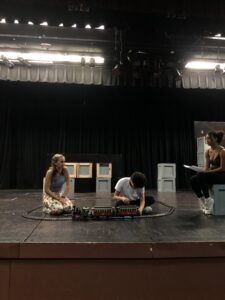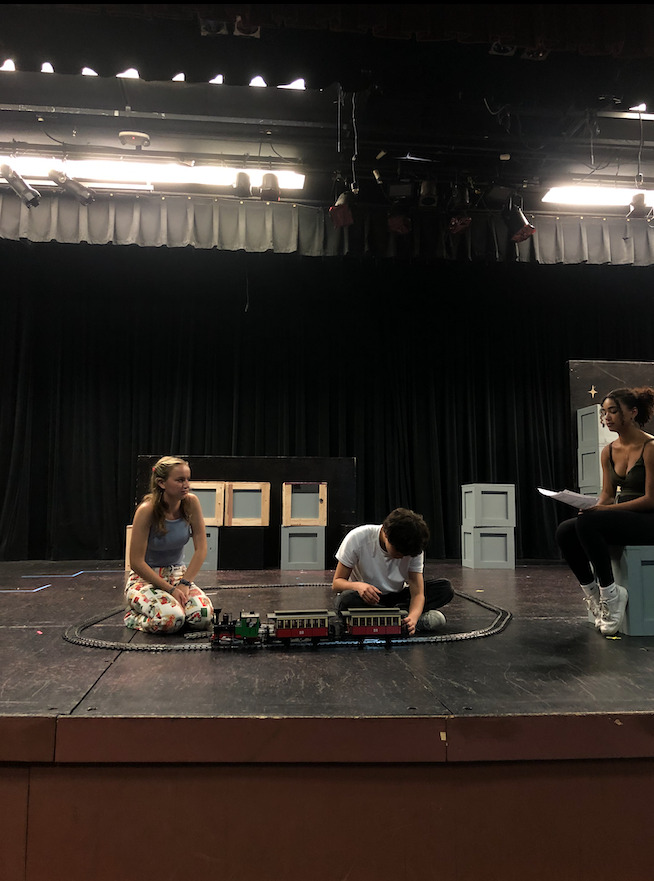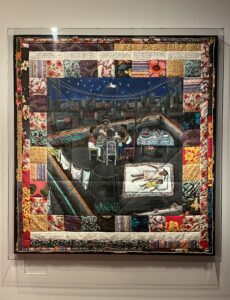From Shakespeare to Netflix, acting has been a central part of our culture. We laugh, we cry, we cheer and we boo. But what does it truly mean to act? What lines can be crossed between core identifiers of actors and their characters? Lick-Wilmerding High School grapples with these questions while preparing for the production of The Curious Incident of the Dog in the Night-Time which will debut November 3rd.
The play follows protagonist Christopher Boone on his journey through life, loss and mystery. It is an adaptation of Mark Haddon’s novel by the same name. The novel is written from the perspective of Christopher, and begins with the mystery of his neighbor’s dead dog. This turns into a moving story about his life, especially his relationship with his family.
It is widely assumed that Christopher is on the spectrum. Haddon said in an interview about the novel, “if [Christopher] were diagnosed, he would be diagnosed with Asperger’s, which is a form of autism.” He continued, “but I’m very careful in the book not to actually use the word Asperger’s or autism…because I don’t want him to be labeled, and because…as with most people who have a disability, I don’t think it’s necessarily the most important thing about him.”
Haddon continued, saying, “it’s not a novel about a boy who has Asperger’s syndrome, it’s a novel about a young mathematician.” The play follows Haddon’s principle of not labeling Christopher’s neurodiversity and instead it focuses on him as a whole person, not as a diagnosis.
So why did LWHS choose Curious Incident as the fall production? Theater teacher and director Miguel Zavala believes that it fosters a sense of empathy that is important to bring to LWHS, especially after the pandemic. “There are some really good acting challenges,” said Zavala. “Thematically, this play is so much about truth.” He commented that the casting process was all about picking somebody who could bring their authentic self to the show. “Christopher doesn’t believe in lies. He holds that as a value that transcends throughout the entire play.” Zavala said.
Zavala acknowledges the anticipated concern with how the neurodiversity of Christopher’s character will be represented. “[We are] not turning this into a caricature or a stereotype, because that’s not truth,” he said. Bringing truth to the show is the only way he thinks it can be presented respectfully. The plot is much more than any suggested neurodiversity exhibited by Christopher. “I think people are getting perhaps a little too zoned in on the uniqueness of Christopher’s character, and it’s really just a beautiful story,” said Tabatha Robinson, Performing Arts Department Chair. “The nuance of neurodiversity is that it’s so diverse,” she said, pointing out that audience members will be able to connect with the show regardless of who they are. “I think that everyone will be able to identify something about themselves in the show and that’s what I really want people to walk away with,” she said. “Not with this really strong sense of who they think this character is, I want them to just sit back and let it unfold,” she continued.
The Learning Strategies Center (LSC), Brain and Behavior (B&B) department and LWHS counselors have been involved with the actors and the crew to educate them on neurodiversity. There was a meeting held with this purpose in mind. “The cast, and stage managers were there that day, Mr. Z, Ms. Robinson, Yuka and Ms. Solís, and Ms. Montgomery were the adults and facilitated the conversation,” said Stage Manager Tabitha Paik ’24.
“It was a forum for all of us to talk about any concerns about the play, about neurodiversity, about the spectrum, [and] about autism,” said Zavala. “What are the concerns? What’s my vision? How can we best support…the cast and crew and have a unified vision?” asked Zavala. He is also planning on visiting Pomeroy Recreation & Rehabilitation Center with Nate Feinland ’24, the actor cast as Christopher as part of his education on the character.
Learning Strategies Center (LSC) Director Winifred Montgomery believes that this play will be successful in its goal of fostering connection and telling an interesting story. “I have been really impressed in the past with some of the artistic risks that have been taken and the amazing stuff that has been done. So I expect a high quality performance,” she said.
Montgomery noted that acting as an art form is about playing a role and being someone else onstage. “At the same time, especially in this era, there are a lot of other things that get pulled into it,” she said. Acting is complicated, just like any art form.
“Mr. Z has met with us in the LSC several times, beginning during the summer. And then the counselors and the Body Mind Education teachers…so there’s been a lot of meeting going on. We are united in…our support of Mr. Zavala’s artistic vision and the students in the play,” Montgomery said. They have been reminding the cast that this play is about much more than Christopher’s suggested neurodivergence. The plot is the main focus, and Christopher’s perspective on life is just that — his perspective.

photo by Simone Edwards
Jenifer Coté is the director of theater at Sonoma Academy, which put on Curious Incident Spring of 2022. She offered her perspective as someone who has already directed the show, and emphasized that putting on this play is incredibly important. “We’re living in a moment where people want to fight about everything,” she said, referencing cancel-culture. “We talk about diversity, equity, and inclusion in the arts. But we can sometimes go so far around the horseshoe in our want to be correct that we end up not doing shows,” she said. “And that’s a really dangerous moment in the arts,” she continued.
She noted that when Sonoma Academy rehearsed Curious Incident, they had a student who identified as being on the spectrum consult on the show and provide first hand feedback in order to enhance and respect the storyline and character.
“If it’s creating conversations at your school–even if they’re hard conversations–I think that’s beautiful.” Coté said. “I think that’s the theater doing its job…when it starts becoming safe and diluted–oh boy–I think we’re in trouble,” she said.“It’s all about research and being comprehensive and being respectful and really purposeful with all your choices,” she said, pointing to the work that she and her cast and crew poured into Curious Incident.
Robinson said, “if a person is approaching it with care and understanding and with the responsibility of the character, then it kind of leaves the door open.” The bottom line, she explained, is that acting is taking on a role, and this means embodying somebody else who has a different experience of life than the actor.
Paik said, “I want [the LWHS community] to have an open mind about this play. It’s obviously a tricky subject, it’s controversial and we are talking about it.” Similar to Robinson and Zavala, Paik asks the LWHS community to withhold judgements and experience the show as it is. “There needs to be conversations around it, but people have to have an open mind.” She emphasized the importance of seeing the play as a story with many different interesting aspects — it is not all about neurodiversity, and assuming that the play is based on stereotypes is false and harmful.
Zavala reflected on all that it takes to be in the theater. “At the end of the day, it’s all about the work,” he said. “It’s about creating a character through the voice and the body and the imagination…it’s about theater, not about gossip or controversy, and it will speak for itself.”







